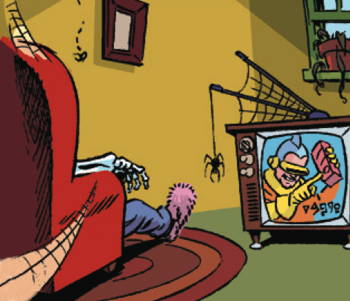December 2022
December 21, 2022
Dryer lint as a source of renewable energy
In the Journal of Analytical and Applied Pyrolysis, a group of researchers recently published what they claim to be "the first research developed to investigate potential applications of dryer lint in the energy recovery field."They collected dryer lint from three different households, analyzed its composition, and then determined its potential use as a fuel. Their conclusion: "lint could be a new sustainable biomass source for renewable energy."
Hopefully they'll analyze the fuel potential of belly-button lint next.

via New Scientist
Posted By: Alex - Wed Dec 21, 2022 -
Comments (4)
Category: Power Generation
A Jazz Lexicon
Pepper your speech with all these forgotten slang terms, and you will acquire an air of coolness and mystery.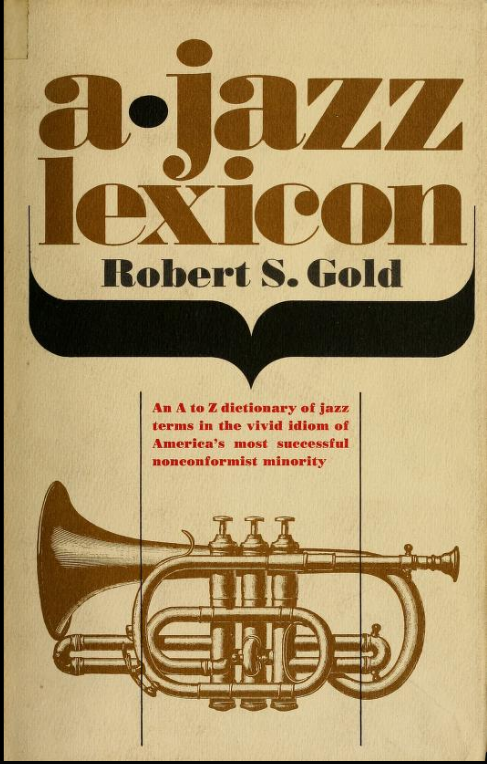
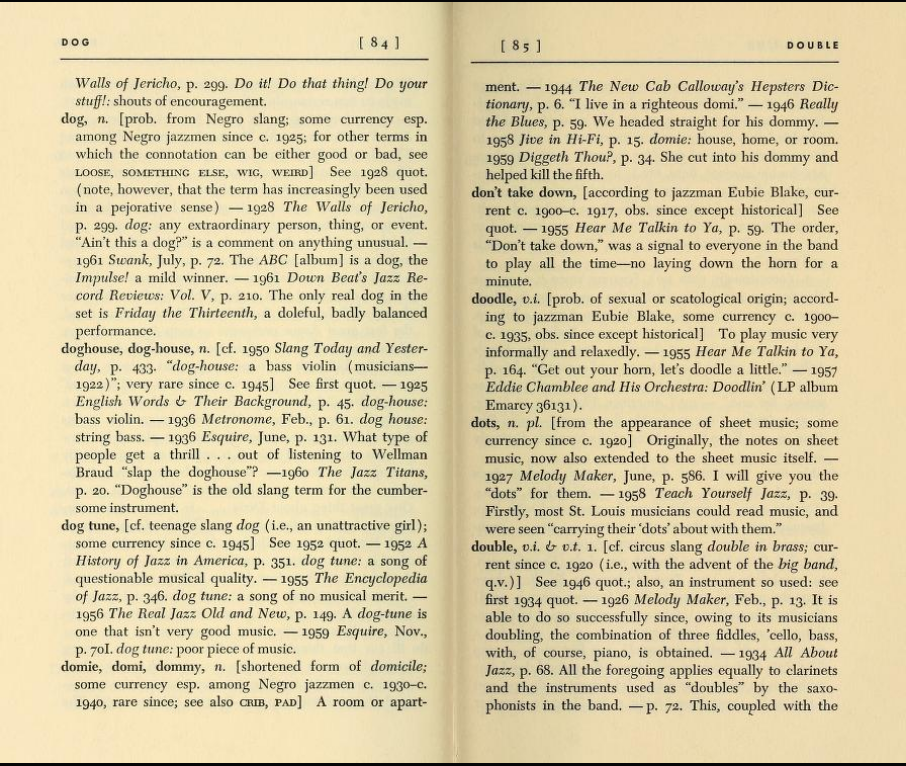
Posted By: Paul - Wed Dec 21, 2022 -
Comments (2)
Category: Music, Bohemians, Beatniks, Hippies and Slackers, 1960s, Slang
December 20, 2022
The woman who sued God and won
On Aug 17, 1960, Betty Penrose's house in Phoenix was hit by lightning. Nine years later she sued God for damages — and won. Kinda. Sorta. Technically, what she won was the right to summon God to a trial which (assuming God would be a no-show) would have resulted in a default judgement against the deity.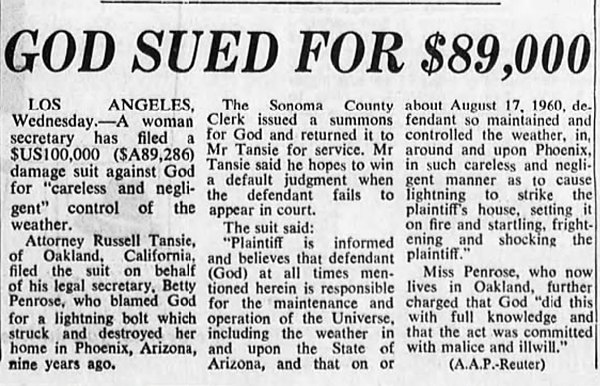
Sydney Morning Herald - May 15, 1969
Some additional context is necessary to understand Penrose's case.
Over in Sebastapol, California, singer Lou Gottlieb had been fighting the county government's attempt to shut down the hippie commune he had started on his Morning Star Ranch. As a legal maneuver to avoid paying the county's fines, Gottlieb deeded his land to God. Then he declared that the county could try collecting the fines from God.
This caused Phoenix attorney Russell Tansie, who was Penrose's employer, to realize that if God now legally owned property (the Morning Star Ranch), then God could be sued for damages. And that's how Penrose's suit emerged.
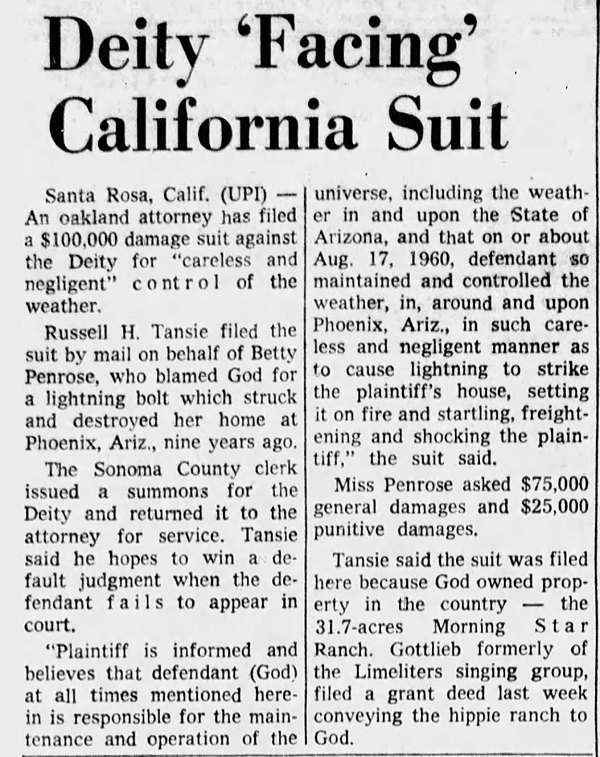
Indianapolis Star - May 14, 1969
However, I don't think Penrose's case ever made it to trial because, back in California, a judge had ruled that God, being neither a "natural or artificial person," could not legally own Gottlieb's ranch. So Gottlieb was still the owner and had to pay the fines.
And if God didn't own the ranch, then Penrose's case became moot.
But if Penrose's case had proceeded, it was possible God wouldn't have been a no-show. San Quentin prisoner Paul Yerkes Bechtel claimed to be God. So he might have appeared in court. And Joseph Njue of Kenya had also offered to defend God.
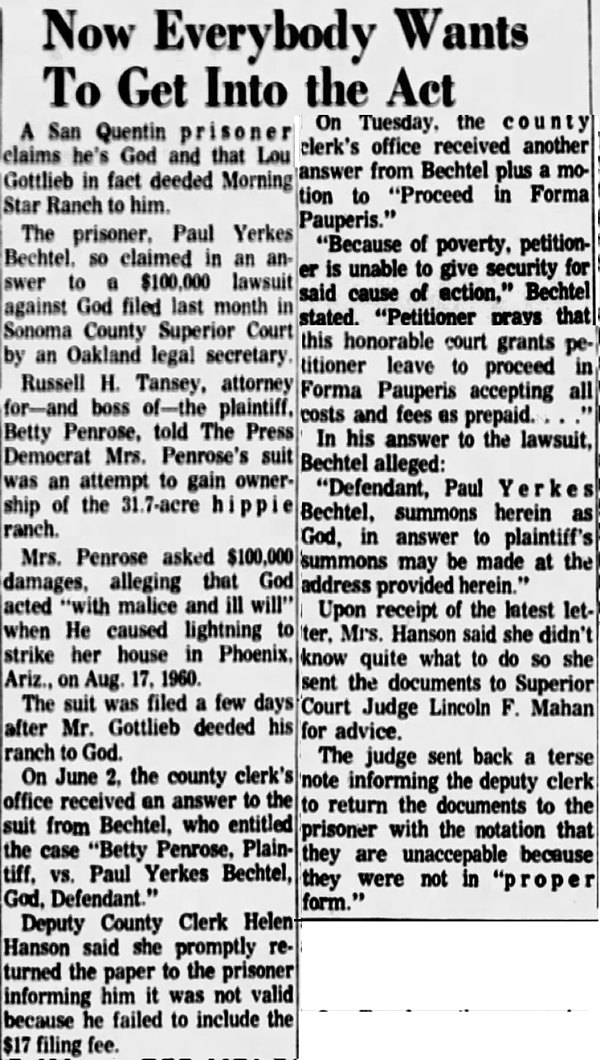
Santa Rosa Press Democrat - June 12, 1969
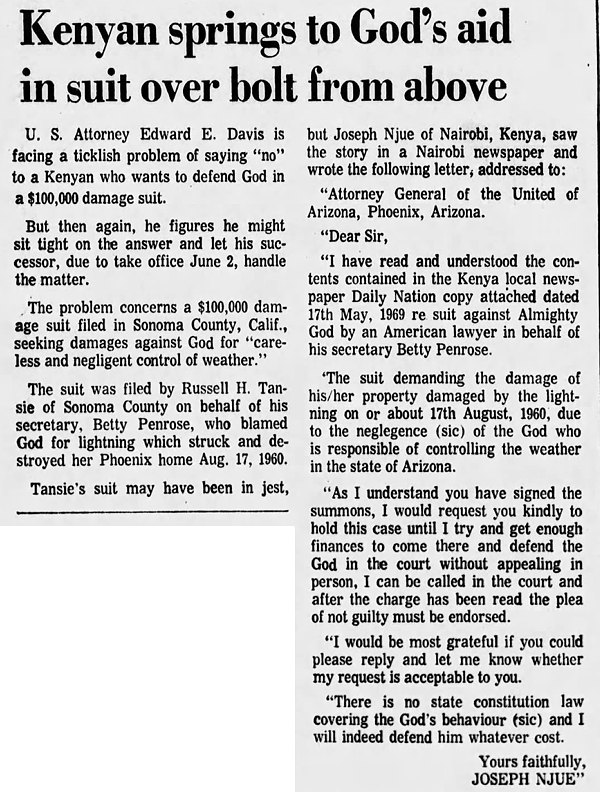
Arizona Republic - May 22, 1969
Posted By: Alex - Tue Dec 20, 2022 -
Comments (2)
Category: Religion, Lawsuits, 1960s, Arizona
George Crumb’s “Black Angels”
Let us all know when you jump ship.The composer's Wikipedia page.
Posted By: Paul - Tue Dec 20, 2022 -
Comments (8)
Category: 1970s, Cacophony, Dissonance, White Noise and Other Sonic Assaults
December 19, 2022
Quickle Queen
Despite the explanation below, I'm not at all sure how a "quickle" differed from a pickle. I suspect that the pickle industry quickly dropped the 'quickle' name and just referred to pasteurized pickles as pickles. Some googling reveals that the majority of the pickles you can find in supermarkets are, in fact, pasteurized. So I guess that, technically, they would be quickles.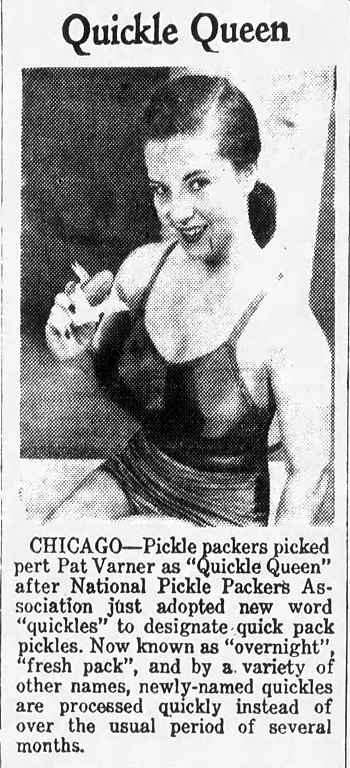
Lyman Leader - Aug 7, 1947
"Pickle packers picked pert Pat Varner." Try saying that three times quickly!
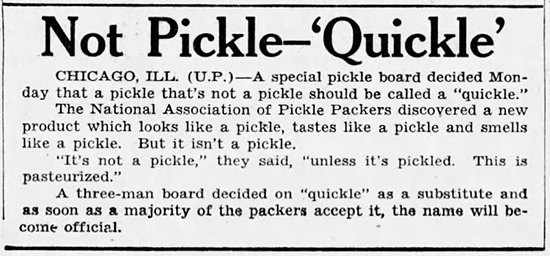
Des Moines Tribune - June 23, 1947
Some better quality images of the Quickle Queen, via akg-images.

Posted By: Alex - Mon Dec 19, 2022 -
Comments (2)
Category: Awards, Prizes, Competitions and Contests, Food, 1940s
Follies of the Madmen #550
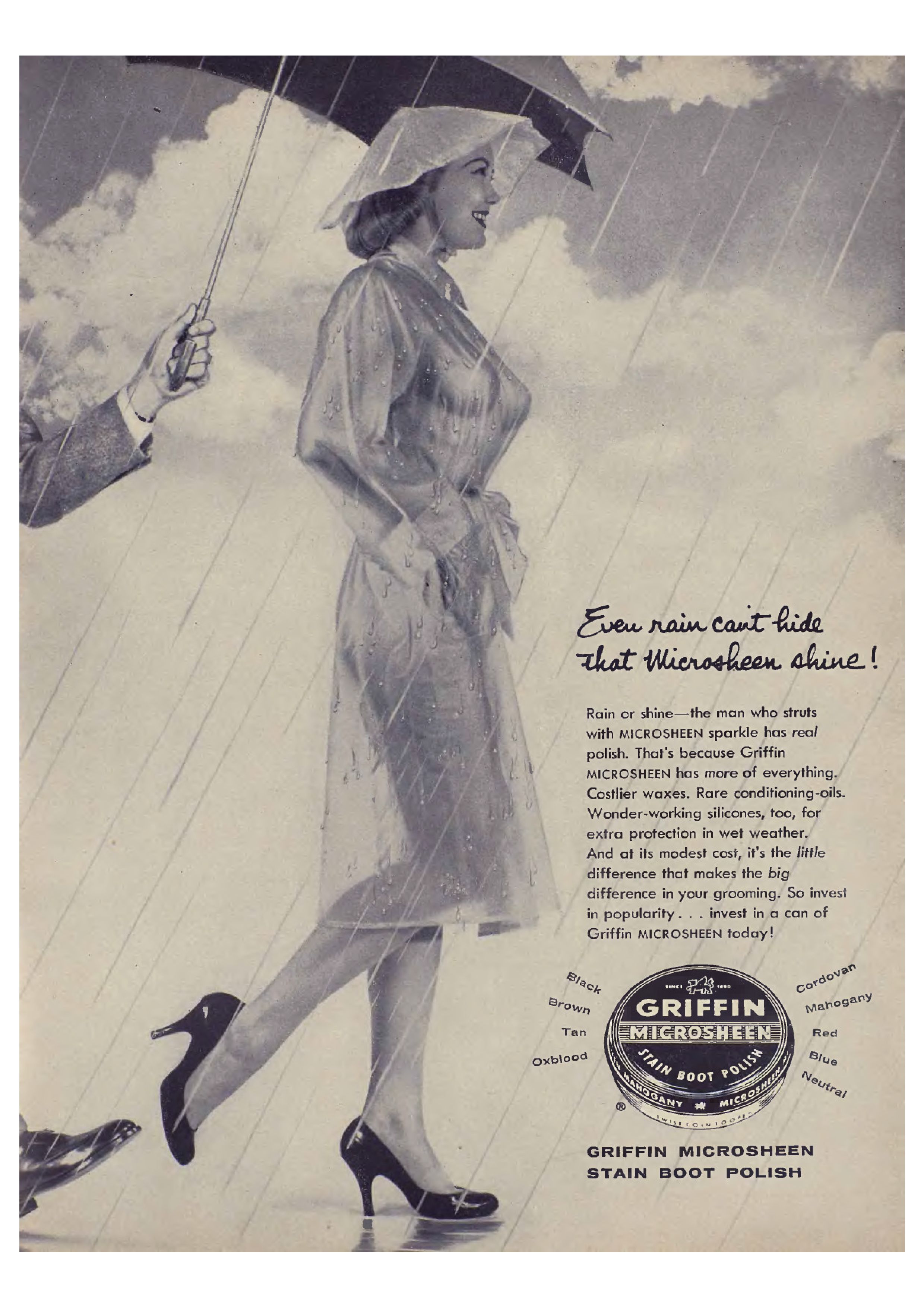
Posted By: Paul - Mon Dec 19, 2022 -
Comments (2)
Category: Fashion, Shoes, Advertising, Public Indecency, Twentieth Century
December 18, 2022
Endogen Depression—Turkeys and TV sets
The art installation "Endogen Depression," by Wolf Vostell, consisted of 30 television sets, partially cast in concrete, and five live turkeys.Vostell presented this installation once in the U.S., at the Los Angeles Institute of Contemporary Art, in December 1980.

source: LA Public Library
Text from the LA Times (Dec 17, 1980):
Vostell means to contrast the sophistication of TVs and turkeys. The birds win handily. He also feels we can learn more from reputedly stupid turkeys than from television, but the comparison may not be a fiar one. The TV drone is so familiar and the programming so low-level, we quickly accept it as easily tuned-out background noise. Turkeys, on the other hand, look downright exotic to city folks who have never encountered one off a serving dish and wearing its feathers.
You can check out a video of the turkeys and TVs from the 1980 event at vimeo.com (embedding was disabled).
Posted By: Alex - Sun Dec 18, 2022 -
Comments (2)
Category: Art, Television, 1980s
The Bull Bowl
As the season for College Bowl games arrives, let us always fondly recall the "Bull Bowl: Pigs vs. Freaks."Full account here.
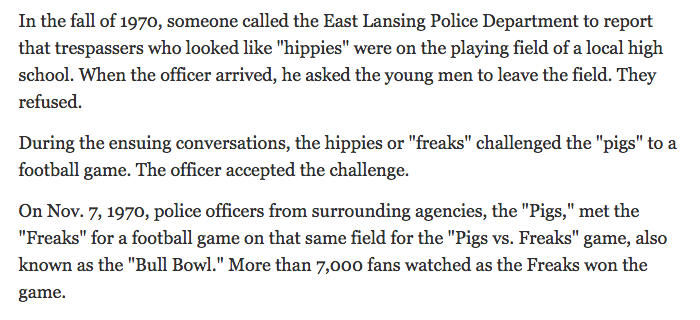
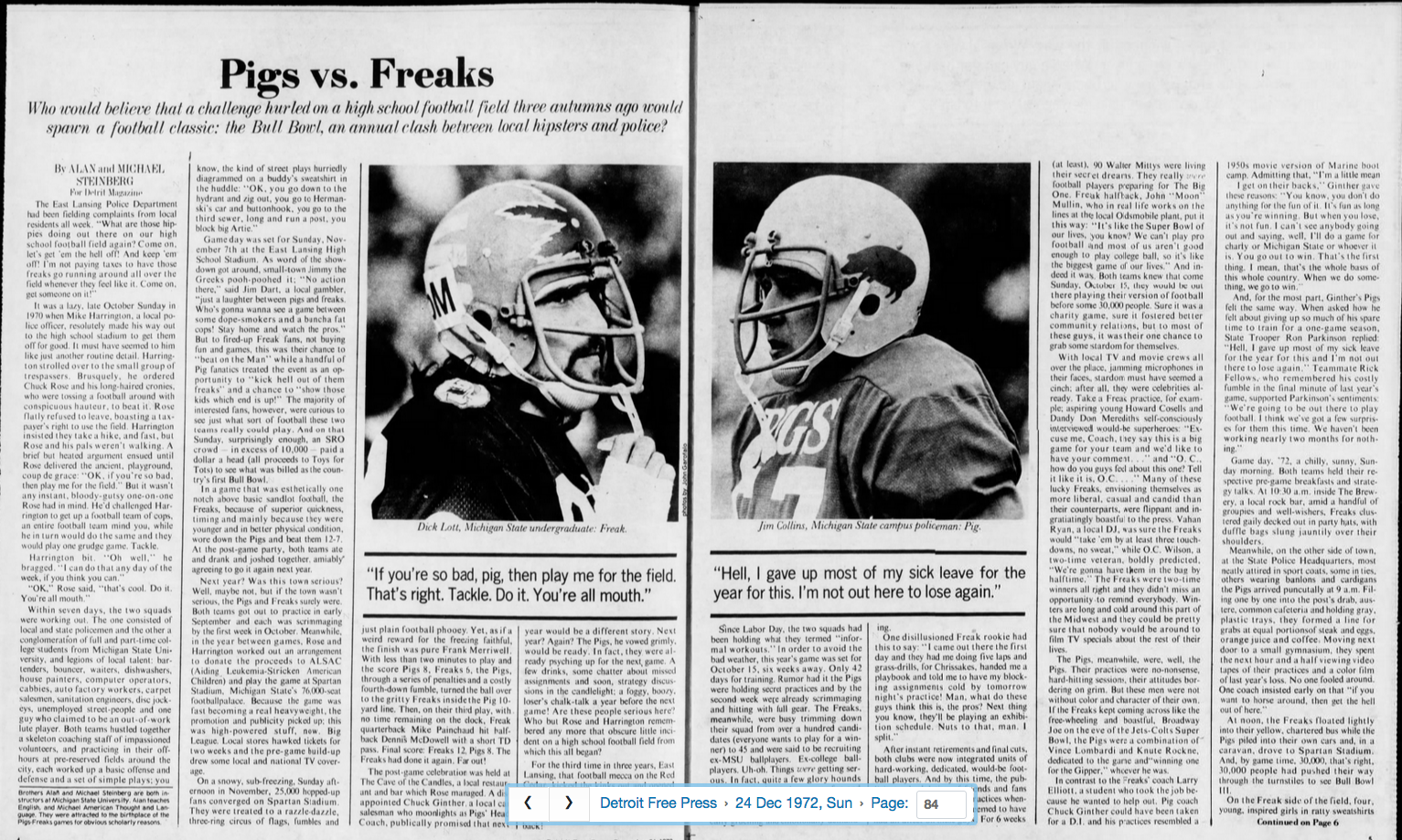
Posted By: Paul - Sun Dec 18, 2022 -
Comments (1)
Category: Police and Other Law Enforcement, Rivalries, Feuds and Grudges, Sports, Bohemians, Beatniks, Hippies and Slackers, 1970s
December 17, 2022
The North Dakota Zap-In, 1969
May 1969: Responding to a suggestion in the North Dakota State University paper that students "Zip to Zap" to stage a "Zap-In" in Zap, North Dakota (population: 300), 3000 young people descended on the town. The Zap-In soon descended into chaos, prompting the mayor to summon the National Guard to remove the students.According to wikipedia, the event was "the only official riot in the history of North Dakota that was put down by the National Guard."
More info: Minot Daily News

Bismarck Tribune - May 10, 1969

Bismarck Tribune - Aug 7, 1969

Students gather around the bonfire built in the middle of Zap's Main Street
source: North Dakota Digital Horizons

The National Guard in Zap
source: North Dakota Historical Society
Posted By: Alex - Sat Dec 17, 2022 -
Comments (0)
Category: Dinners, Banquets, Parties, Tributes, Roasts and Other Celebrations, Riots, Protests and Civil Disobedience, 1960s
Fun in a Bakery Shop
The last head sculpted in the video below is plainly that of a comic Irishman, supreme butt of all ethnic humorists.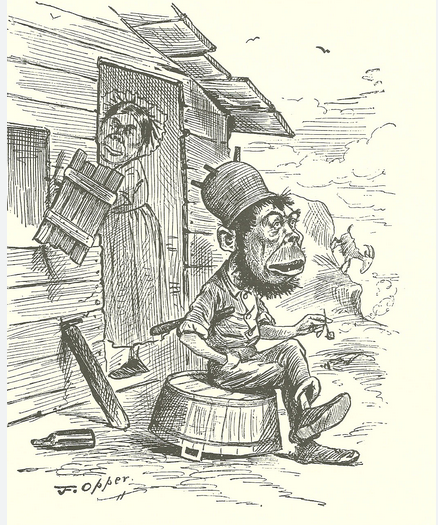
Posted By: Paul - Sat Dec 17, 2022 -
Comments (1)
Category: Ethnic Groupings, Food, Movies, Stereotypes and Cliches, Ridiculousness, Foolishness, Public Ridicule, Silliness, Goofiness and Dumb-looking, 1900s
| Get WU Posts by Email | |
|---|---|

| Who We Are |
|---|
| Alex Boese Alex is the creator and curator of the Museum of Hoaxes. He's also the author of various weird, non-fiction books such as Elephants on Acid. Paul Di Filippo Paul has been paid to put weird ideas into fictional form for over thirty years, in his career as a noted science fiction writer. He has recently begun blogging on many curious topics with three fellow writers at The Inferior 4+1. Chuck Shepherd Chuck is the purveyor of News of the Weird, the syndicated column which for decades has set the gold-standard for reporting on oddities and the bizarre. Our banner was drawn by the legendary underground cartoonist Rick Altergott. Contact Us |
